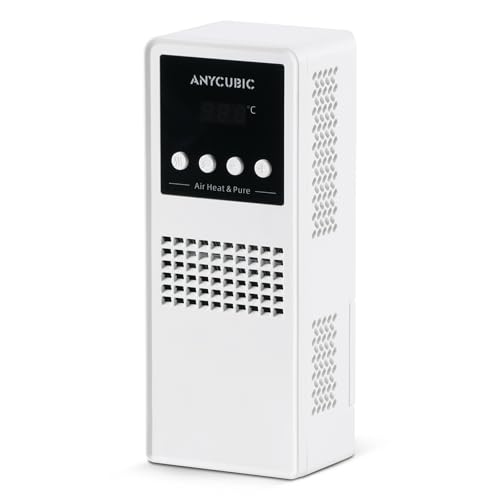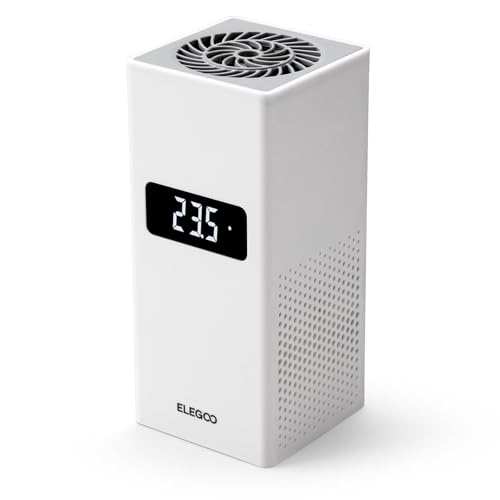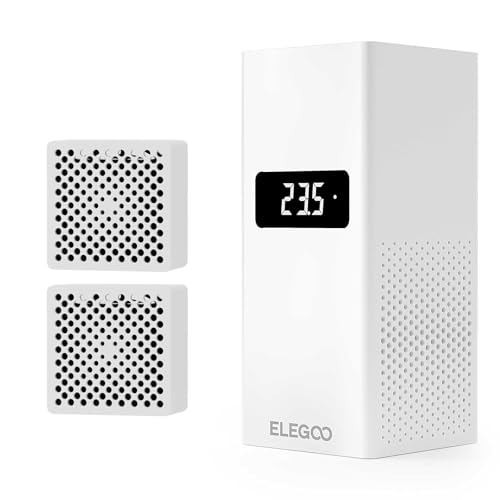Keeping the resin chamber at the right temperature improves print reliability, layer adhesion, and cure consistency. Below is a concise comparison of selected mini heaters designed for LCD/DLP/MSLA resin 3D printers.
| Product | Brand | Key Features |
|---|---|---|
| YOUYOUTE Mini Heater | YOUYOUTE | Adjustable Target Temp 10–50°C, continuous 24/7 operation |
| ANYCUBIC Mini Purifier & Heater | ANYCUBIC | 2-in-1 preheat + air purification, 55W rapid warming |
| ELEGOO Smart Mini Heater | ELEGOO | PTC rapid heating, intelligent control, air filtration |
| Chitu Systems Mini Heater | chitu systems | High power up to 200W, quiet fan, easy install |
| ELEGOO Mini Heater (Saturn/Mars Compatible) | ELEGOO | Auto 25°C control, PTC heating, high-speed fan, filtration |
YOUYOUTE Mini Heater For Resin Printers

The YOUYOUTE Mini Heater Is Designed Specifically For Resin 3D Printers And Emphasizes adjustable target temperature control. It Lets Users Set A Target From 10°C To 50°C, Noting The Optimal Resin Temperature Around 30°C For Many Formulations.
Features Include Buttons For Direct Temperature Input, A Compact Footprint Suited For Printer Chambers, And Engineering Intended For Continuous 24/7 Operation. The Dual-Sided PCB And Professional Wiring Aim To Extend Durability During Prolonged Use.
Practical Use Cases: This Unit Is Useful In Cold Environments Where Resin Viscosity And Print Adhesion Suffer. The Direct Setpoint Capability Is Beneficial When Specific Resin Data Sheets Recommend A Precise Chamber Temperature.
ANYCUBIC Mini Purifier & Heater

The ANYCUBIC Mini Purifier & Heater Combines Preheating And Air Purification In One Compact Module. Its Dual Functionality Provides Independent Control For Heating And Filtration, Addressing Both Print Reliability And Workspace Air Quality.
Key Features Include A 55W Heater For Rapid Chamber Warming, A High-Precision Sensor Accurate To 0.1°C, And Intelligent Power Adjustment When Ambient Temperatures Reach Higher Thresholds. The Unit Is Sized For Most Resin Printers And Targets Environments Below 25°C (77°F).
Operational Benefits: Rapid Warm-Up Helps Prevent Bottom-Layer Failures Caused By Low Resin Temperature. The Integrated Purifier Helps Reduce Volatile Smells And Particulate Contaminants Inside The Enclosure, Supporting A Cleaner Print Chamber.
ELEGOO Smart Mini Heater With Filtration

ELEGOO’s Smart Mini Heater Focuses On Intelligent Temperature Control And PTC Rapid Heating Technology. The PTC Element Offers Self-Regulating Heating That Limits Overheating Risks And Stabilizes Chamber Temperature.
Additional Design Elements Include An Air Filtration Module To Remove Impurities And A Control System Aimed At Minimizing Issues Like Mid-Print Detachment, Warping, Or Poor Layer Adhesion Caused By Low Chamber Temperatures.
Performance Notes: PTC Heaters Quickly Reach Operating Temperature And Reduce Power Draw As The Chamber Stabilizes. The Inclusion Of Air Filtration Addresses Both print consistency and workplace comfort factors for indoor operations.
Chitu Systems Upgraded Mini Heater

The Chitu Systems Mini Heater Emphasizes Versatility And Installation Ease. It Is Marketed For Broad Compatibility With Most LCD 3D Printers And Highlights A User-Friendly Setup That Avoids Drilling Or Major Printer Modifications.
Key Technical Points Include Adjustable Temperature Control And A Maximum Power Rating Up To 200W, Which Enables Faster Heating Rates In Larger Enclosures Or Cooler Ambient Conditions. The Unit Also Notes A Low-Noise Fan And Overheat Protection.
Use Context: Higher Power Capacity Makes This Module Suitable For Larger Printer Chambers Or Situations Where Faster Recovery After Door Opening Is Desired. Quiet Operation Is Useful In shared spaces or home workshops.
ELEGOO Mini Heater For Saturn And Mars

ELEGOO Also Offers A Mini Heater Specifically Noted As Compatible With Its Saturn, Mars, And Jupiter SE Lines. This Version Features Automatic 25°C Control, Engaging Heating Below The Setpoint And Stopping Once The Chamber Exceeds 25°C.
Technical Highlights Include PTC Heating Technology Paired With A High-Speed Fan (Up To 10,000 RPM) For Rapid, Even Heat Distribution, Plus An Air Filtration Module To Improve Internal Chamber Environment.
Intended Benefit: The Auto 25°C Setpoint Targets The Typical Operating Range For Many Resins And Simplifies Operation For Users Who Prefer A Recommended Default Temperature Without Manual Adjustments.
Buying Guide: How To Choose A Resin Printer Heater
Selecting The Right Heater Depends On Printer Size, Resin Type, Environment, And Safety Preferences. Below Are The Primary Factors To Evaluate When Comparing Models.
Chamber Size And Heating Power
Match Heater Output To Your Printer Chamber Volume. Higher Wattage Units Heat Faster And Maintain Temperature In Larger Enclosures, While Low-Power Modules Suit Small printers or minor adjustments.
Temperature Control And Accuracy
Look For Adjustable Setpoints Or Intelligent Control Algorithms. Precision (±0.1°C Or Better) Helps When Working With Resins That Require Tighter Thermal Ranges to maintain viscosity and cure behavior.
Heating Technology
PTC (Positive Temperature Coefficient) Heaters Offer Self-Regulating Safety, Reducing Overheat Risk. Resistive Elements Can Provide Higher Power But May Require Additional safeguards.
Preheat Versus Continuous Heating
Decide Whether You Need Rapid Preheat Capability For Short Warm-Up Times Or Continuous Temperature Maintenance For Long Prints. Some units support both modes.
Integration And Installation
Consider How The Unit Mounts Inside Your Printer. Prefer Tool-Free Or Non-Invasive Installations To Avoid Printer Modifications That Might Void Warranties or compromise sealing.
Air Filtration And Odor Control
Heaters With Integrated Filtration Help Reduce VOCs And Odors Inside The Enclosure. Filtration Can Improve User Comfort And May Protect Internal optics from contaminants.
Sensor Placement And Feedback
Temperature Sensor Location Affects Accuracy. Sensors Close To The Print Bed Or Resin Surface Provide Better Control For Layer Adhesion, While Chamber sensors give averaged ambient readings.
Safety Features
Prioritize Units With Overheat Protection, Thermal Cutoffs, And Fan Fail Safeguards. Continuous operation calls for robust thermal management and reliable components.
Compatibility With Your Printer And Resin
Check Manufacturer Notes For Compatibility With Specific Printer Models Or Enclosure Geometries. Some heaters Are Sized Or Branded For Particular Series (eg. Saturn, Mars) And Include Fitment Guidance.
Noise And Fan Performance
Fans Improve Heat Distribution But Add Noise. If You Operate In A Shared Space, Look For Lower RPM Fans Or Quieter Designs Without Sacrificing Airflow For Even Heating.
Power Consumption And Efficiency
Consider Ongoing Energy Use For Continuous Heating. PTC And Smart Controllers Usually Reduce Power Draw Once The Target Temperature Is Reached.
Maintenance And Filter Replacement
If The Unit Includes A Filter, Confirm Replacement Schedules And Availability. Easy Access To Filters And Simple Cleaning Procedures Reduce Downtimes.
Use Cases And Print Goals
- Small Fixtures And Prototypes: Low-wattage or compact heaters suffice.
- Large Prints Or Long Sessions: Choose higher-power units with stable control.
- Color-Sensitive Or High-Precision Prints: Tight temperature regulation and filtration help consistency.
Multiple perspectives—thermal performance, installation ease, safety, and filtration—should be balanced when choosing a heater to improve resin printing success and maintain a safe workspace.